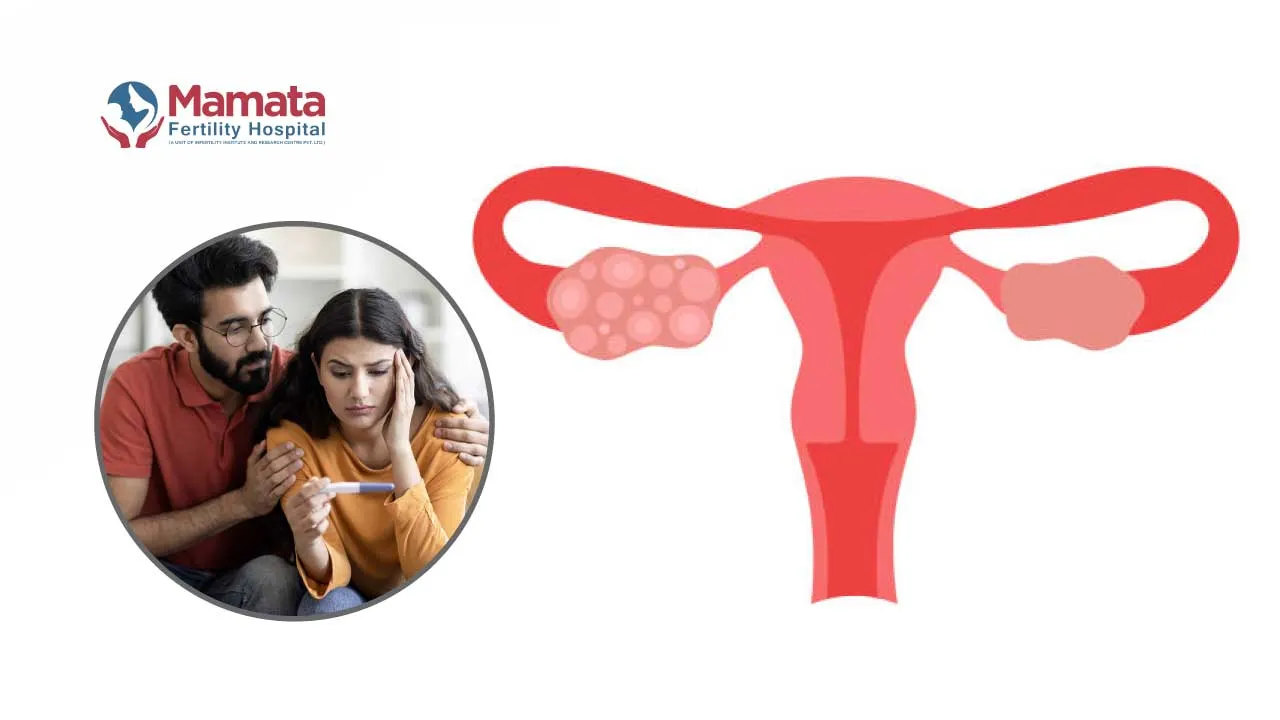Polycystic Ovary Syndrome (PCOS) is a hormonal disorder that affects millions of women worldwide. Known for its impact on fertility, PCOS often raises concerns for women and couples trying to conceive. But does PCOS cause infertility? While the condition can complicate the process of conception, it doesn’t necessarily mean permanent infertility. Effective treatments and lifestyle modifications can significantly improve fertility outcomes.
At Mamata Fertility Hospital Hyderabad, we understand how PCOS affects reproductive health, and we provide expert guidance to help women achieve their dreams of becoming mothers. Below, we’ll explore how PCOS impacts fertility, treatment options, and the chances of pregnancy with PCOS.
How Does PCOS Cause Infertility?
PCOS can directly interfere with a woman’s ability to conceive by disrupting normal ovulation and hormonal balance. Here’s how:
1. Irregular Ovulation (Anovulation)
One of the key effects of PCOS is anovulation, where the ovaries fail to release an egg during the menstrual cycle. This happens due to imbalances in hormones like LH (luteinizing hormone) and FSH (follicle-stimulating hormone), which are critical for ovulation. Without regular ovulation, conception becomes difficult.
2. Insulin Resistance
Many women with PCOS experience insulin resistance, which means their bodies struggle to use insulin effectively. This leads to elevated insulin levels, which, in turn, increases the production of androgens (male hormones). High androgens disrupt the normal menstrual cycle and contribute to infertility.
3. High Androgen Levels
Excess levels of androgens such as testosterone can inhibit the development and release of eggs. These hormones can also lead to symptoms like excess hair growth (hirsutism) and acne, further signaling hormonal dysregulation.
4. Ovarian Cysts
PCOS is associated with multiple small cysts on the ovaries. While these cysts don’t always cause infertility, their presence indicates underlying hormonal imbalances that can affect reproductive health.
Can Women with PCOS Get Pregnant?
The short answer is yes, women with PCOS can get pregnant. However, it may require additional effort, patience, and medical support depending on the severity of the condition. Here’s how conception might look for women with PCOS:
1. Natural Conception
Some women with mild PCOS might conceive naturally by making lifestyle changes to regulate their hormones. Weight loss, for example, can restore ovulation and improve the chances of natural conception. Monitoring ovulation cycles using basal body temperature or ovulation predictor kits can also help identify fertile windows.
2. Fertility Treatments
For women who struggle with natural conception, fertility treatments can significantly improve their chances:
Ovulation-Inducing Medications:
Drugs like Clomid (clomiphene citrate) and Letrozole stimulate ovulation, increasing the likelihood of pregnancy.
Assisted Reproductive Techniques (ART):
Procedures like IUI (intrauterine insemination) or IVF (in vitro fertilization) may be recommended for women who do not respond to medications or have other complicating factors.
At Mamata Fertility Hospital Hyderabad, our fertility specialists provide personalized treatment plans to address PCOS-related infertility, ensuring the best possible outcomes for every patient.
Treatment Options for PCOS-Related Infertility
If you have PCOS and are struggling to conceive, several treatment options are available to help you on your fertility journey:
1. Lifestyle Changes
Following a low-glycemic index (GI) diet can help regulate insulin levels and improve ovulation, making it an important dietary choice for those looking to enhance fertility. Regular exercise also plays a key role, as it reduces insulin resistance and helps balance hormones. Additionally, managing weight is crucial; losing just 5-10% of body weight can significantly improve ovulation and overall fertility.
2. Medications
Ovulation Inducers: Clomid and Letrozole are commonly prescribed to stimulate ovulation.
Metformin: This medication helps regulate insulin levels, particularly for women with PCOS and insulin resistance.
Hormonal Therapy: Birth control pills may be used to regulate menstrual cycles before attempting conception.
3. Assisted Reproductive Techniques (ART)
IUI (Intrauterine Insemination): Often used in cases of mild infertility, IUI involves placing sperm directly into the uterus during ovulation.
IVF (In Vitro Fertilization): For more severe cases, IVF offers a higher chance of conception by fertilizing eggs outside the body and implanting embryos into the uterus.
Ovulation Tracking: Monitoring ovulation can help time intercourse or IUI for the best results.
4. Surgery
For women who do not respond to other treatments, procedures like ovarian drilling may be an option. This minimally invasive surgery can reduce androgen levels and restore ovulation.
Success Stories & Expert Guidance
At Mamata Fertility Hospital Hyderabad, we’ve helped countless women with PCOS achieve successful pregnancies. By combining advanced diagnostic tools with a compassionate approach, we create treatment plans tailored to each patient’s unique needs.
One of our patients, a 32-year-old woman diagnosed with severe PCOS, came to us after years of unsuccessful attempts to conceive. With the help of weight management counseling, ovulation tracking, and an IVF cycle tailored to her specific hormonal profile, she delivered a healthy baby just 18 months later. Stories like hers inspire hope for many women facing similar challenges.
Our team of fertility specialists in Hyderabad leverages cutting-edge technology and evidence-based practices to ensure the best possible outcomes for families.
FAQs
Does PCOS cause infertility?
PCOS can lead to infertility by disrupting ovulation and hormonal balance, but it is not a permanent condition. With proper treatment, most women with PCOS can conceive.
Can PCOS affect pregnancy?
While women with PCOS may face a higher risk of complications like gestational diabetes or preterm birth, regular monitoring and care can ensure a healthy pregnancy.
How to get pregnant with PCOS naturally?
Adopt a fertility-friendly lifestyle, including a balanced diet, regular exercise, and stress management. Monitor ovulation and time intercourse accurately.
Conclusion & Call to Action
PCOS can present fertility challenges, but with the right approach, these challenges are surmountable. Through lifestyle changes, medical treatments, and the guidance of fertility specialists, many women with PCOS have gone on to conceive and deliver healthy babies.
If you’re struggling with PCOS and infertility, don’t wait any longer to seek help. At Mamata Fertility Hospital Hyderabad, we’re here to support you every step of the way. Our team of experts offers personalised care and cutting-edge treatments to ensure the best outcomes for your fertility goals.




